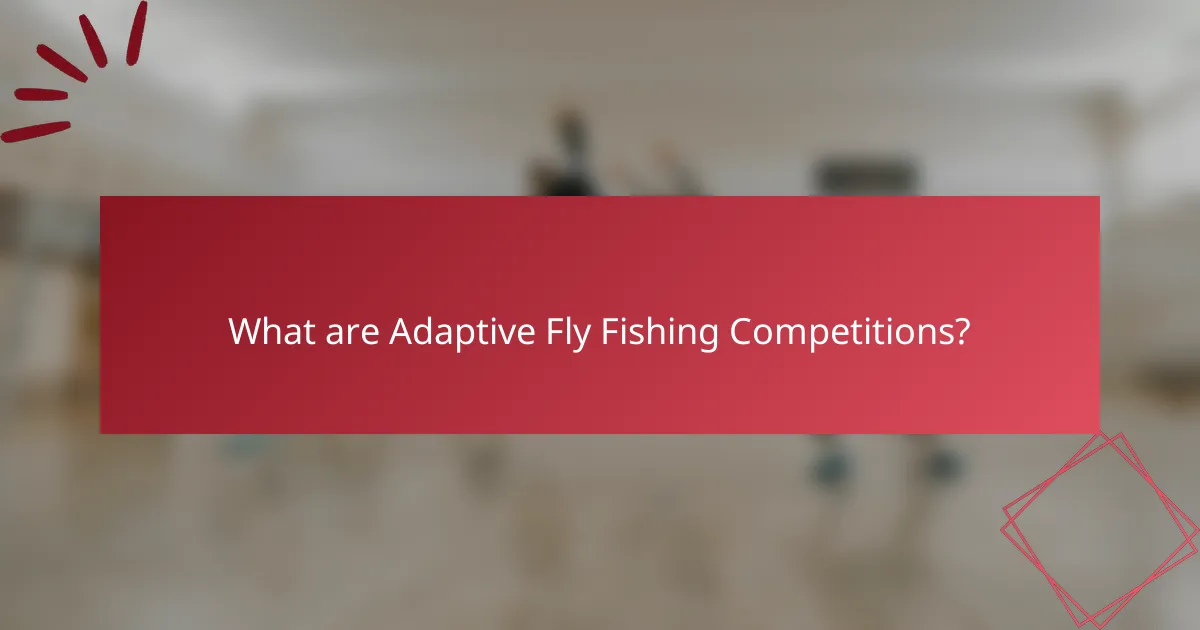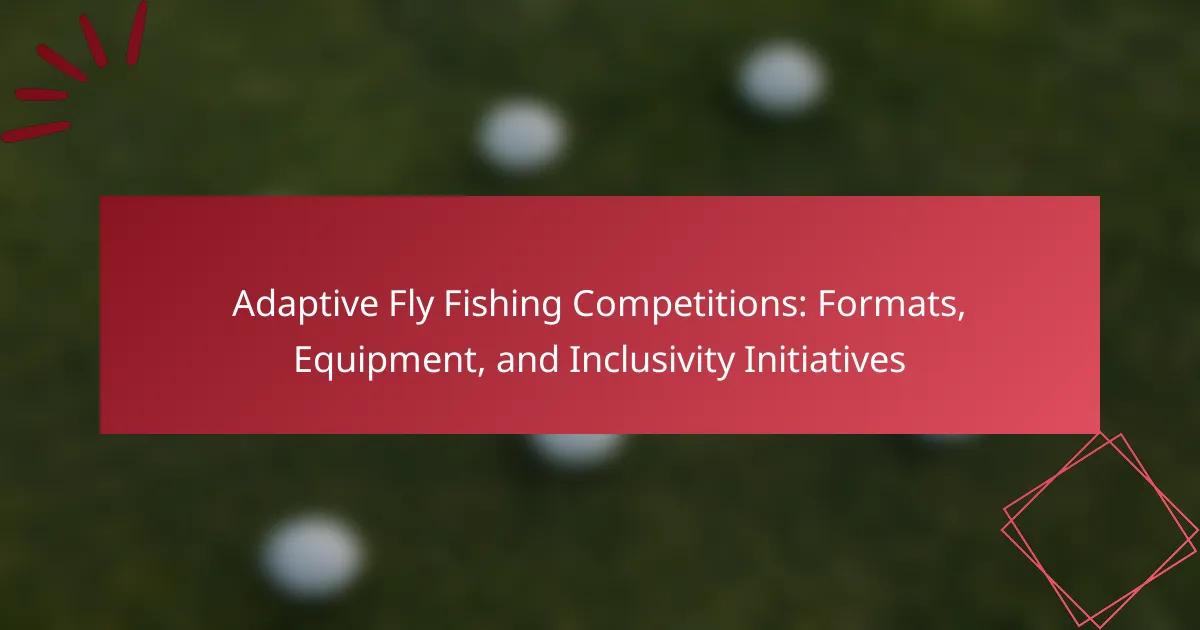Adaptive fly fishing competitions are structured events that allow individuals with disabilities to engage in fly fishing, fostering an inclusive atmosphere. These competitions utilize specialized equipment designed to meet diverse physical and cognitive needs, along with modified rules to ensure equitable participation. The events not only enhance participants’ fishing skills but also encourage social interaction and community building. Organizations that facilitate these competitions play a crucial role in promoting awareness of inclusivity in outdoor activities, highlighting a growing trend towards accessibility in sports. This article will explore the various formats of adaptive fly fishing competitions, the equipment used, and the initiatives aimed at enhancing inclusivity.

What are Adaptive Fly Fishing Competitions?
Adaptive fly fishing competitions are events designed for individuals with disabilities to participate in fly fishing. These competitions provide an inclusive environment that accommodates various physical and cognitive challenges. Participants use specialized equipment tailored to their needs. The events often feature modified rules to ensure fair competition. Adaptive fly fishing promotes skill development and social interaction among competitors. Organizations hosting these competitions aim to raise awareness about inclusivity in outdoor activities. The growth of adaptive competitions reflects a broader trend towards accessibility in sports.
How do Adaptive Fly Fishing Competitions differ from traditional competitions?
Adaptive Fly Fishing Competitions differ from traditional competitions primarily in their focus on inclusivity and accessibility for individuals with disabilities. These competitions are designed to accommodate various physical challenges, allowing participants to compete on equal footing. Traditional competitions often do not consider the specific needs of disabled anglers. Adaptive competitions may feature specialized equipment, such as modified rods or accessible fishing platforms. They also often include categories that recognize different abilities, ensuring fair competition. This inclusivity promotes participation among a broader range of individuals. Furthermore, adaptive competitions encourage community involvement and support, fostering a welcoming environment.
What unique formats are used in Adaptive Fly Fishing Competitions?
Adaptive Fly Fishing Competitions utilize unique formats designed to accommodate various disabilities. These formats include team-based events, where participants fish in pairs or groups. Another format is the individual competition, allowing solo participation with tailored assistance. Some competitions feature catch-and-release formats, emphasizing conservation and sustainable practices. Additionally, events may incorporate specific categories based on disability types. This ensures fair competition and inclusivity. These unique formats foster community engagement and promote accessibility in the sport.
Why is inclusivity important in Adaptive Fly Fishing Competitions?
Inclusivity is important in Adaptive Fly Fishing Competitions because it ensures equal access for individuals with disabilities. This participation fosters a sense of community and belonging among diverse anglers. Inclusivity promotes the sharing of knowledge and experiences, enhancing the overall competition environment. It allows for the development of adaptive techniques and equipment tailored to various needs. Statistics show that inclusive events increase participation rates, thereby enriching the sport. Research indicates that diverse groups lead to better problem-solving and innovation. Ultimately, inclusivity enhances the reputation and reach of Adaptive Fly Fishing as a sport.
What types of equipment are essential for Adaptive Fly Fishing?
Essential equipment for Adaptive Fly Fishing includes specialized rods, reels, and lines. Adaptive rods are often shorter and lighter, allowing for easier handling. Reels may feature larger spools for smoother line retrieval. Lines should be weight-forward to facilitate casting. Additionally, adaptive gear may include ergonomic grips and modified harnesses for better control. Safety equipment, such as life jackets, is also crucial. These adaptations ensure inclusivity and accessibility for all participants.
How does specialized equipment enhance the experience for adaptive anglers?
Specialized equipment enhances the experience for adaptive anglers by providing tailored solutions to their unique needs. This equipment includes adaptive rods, reels, and tackle designed for ease of use. For example, rod holders and specialized grips allow anglers with limited mobility to fish comfortably. Additionally, modified casting aids can assist those with strength challenges in achieving accurate casts.
These innovations improve accessibility and independence while increasing participation in the sport. According to a study by the Journal of Outdoor Recreation and Tourism, adaptive equipment significantly boosts confidence and enjoyment among anglers with disabilities. Enhanced comfort and usability lead to longer fishing sessions and greater overall satisfaction.
What are the key features of adaptive fly fishing gear?
Adaptive fly fishing gear includes features designed for accessibility and comfort. These features often consist of specialized rod grips that accommodate various hand sizes and strengths. Adjustable reels enable users to modify drag settings easily. Lightweight materials reduce fatigue during prolonged use. Customizable vest pockets allow for easy access to tackle and tools. Floatation devices enhance safety while fishing. Additionally, ergonomic seating options provide comfort for longer fishing sessions. These elements collectively enhance the fishing experience for individuals with diverse abilities.
What inclusivity initiatives support Adaptive Fly Fishing Competitions?
Inclusivity initiatives for Adaptive Fly Fishing Competitions include specialized training programs and accessible equipment. These initiatives aim to accommodate individuals with disabilities. Organizations like Casting for Recovery provide therapeutic fly fishing retreats. Programs often focus on adaptive techniques for casting and retrieving. Partnerships with local fishing clubs promote inclusive events. Accessibility standards are implemented at competition venues. Financial assistance is available for participants needing adaptive gear. These efforts ensure broader participation in adaptive fly fishing.
How do these initiatives promote participation among diverse groups?
These initiatives promote participation among diverse groups by implementing inclusive practices and adaptive equipment. They provide tailored training programs that cater to various skill levels and abilities. Accessible venues are chosen to ensure everyone can participate. Outreach efforts target underrepresented communities to raise awareness. Collaborative partnerships with organizations support diverse participation. These initiatives also create a welcoming environment that fosters camaraderie and support among participants. Research shows that inclusivity in sports increases engagement and satisfaction among diverse groups.
What organizations are leading the charge for inclusivity in fly fishing?
Organizations leading the charge for inclusivity in fly fishing include the Casting for Recovery and the Fly Fishers International. Casting for Recovery focuses on providing fly fishing retreats for women with breast cancer. They create supportive environments that promote healing and camaraderie. Fly Fishers International offers educational programs and resources aimed at increasing participation among underrepresented groups. Their initiatives include workshops and community outreach programs to engage diverse populations in the sport. These organizations actively work to break down barriers and foster a more inclusive fly fishing community.
What are the challenges faced in Adaptive Fly Fishing Competitions?
Adaptive Fly Fishing Competitions face several challenges. Accessibility to fishing locations is a significant issue. Many sites lack necessary infrastructure for individuals with disabilities. Equipment adaptation poses another challenge. Specialized gear can be expensive and not widely available. Additionally, competition formats may not always accommodate diverse abilities. This can lead to unequal participation opportunities. Training and support resources are often limited for adaptive anglers. These factors can hinder overall engagement in adaptive fly fishing events.
How can organizers address accessibility issues in competitions?
Organizers can address accessibility issues in competitions by implementing various strategies. They should ensure venues are wheelchair accessible, including ramps and designated seating. Providing transportation options for participants with mobility challenges is essential. Accessible restrooms must be available throughout the competition area. Organizers should offer materials in multiple formats, such as large print or audio. Staff training on disability awareness can improve interactions with participants. Additionally, organizers can solicit feedback from participants with disabilities to identify specific needs. These measures enhance inclusivity and ensure all participants can compete fairly.
What strategies can be implemented to improve the experience for adaptive anglers?
Implementing strategies to improve the experience for adaptive anglers includes providing specialized equipment and accessible locations. Adaptive fishing gear, such as rod holders and modified reels, enhances usability. Accessible fishing spots should feature ramps and clear pathways. Training programs for guides can increase their understanding of adaptive needs. Offering workshops can help adaptive anglers learn new techniques. Collaborating with organizations focused on disability can foster inclusivity. Regular feedback from adaptive anglers can inform ongoing improvements. Statistics show that inclusive initiatives increase participation and satisfaction among adaptive anglers.
How can participants prepare for Adaptive Fly Fishing Competitions?
Participants can prepare for Adaptive Fly Fishing Competitions by practicing their casting techniques regularly. Consistent practice enhances skill and builds confidence. Participants should familiarize themselves with the specific rules of the competition. Understanding the guidelines helps avoid penalties.
Choosing the right equipment is crucial for success. Participants should select gear that accommodates their individual needs. This includes adaptive rods and reels tailored for their abilities. Participants should also scout the competition location in advance. Knowing the terrain can improve strategy and performance.
Physical conditioning can enhance endurance and stability. Engaging in strength and flexibility exercises is beneficial. Participants should also connect with experienced anglers for tips and mentorship. Learning from others can provide valuable insights. Lastly, mental preparation is key. Visualization techniques can help manage anxiety and improve focus.
What tips are essential for successful participation in these events?
Essential tips for successful participation in adaptive fly fishing competitions include thorough preparation, understanding the rules, and practicing casting techniques. Participants should familiarize themselves with the specific competition format and any adaptive equipment that may be used. Engaging with fellow competitors and sharing experiences can enhance skills and provide valuable insights. Additionally, maintaining a positive attitude and being adaptable to changing conditions are crucial. Staying hydrated and nourished during the event supports physical stamina. Finally, reviewing past competition results can help identify areas for improvement and strategies for success.
How can adaptive anglers improve their skills before competitions?
Adaptive anglers can improve their skills before competitions by practicing specific techniques regularly. Consistent practice enhances muscle memory and technique proficiency. Utilizing adaptive equipment tailored to their needs can also contribute to performance improvement. Engaging in local fishing clubs provides opportunities for skill sharing and mentorship. Participating in workshops focused on adaptive fishing techniques can further refine their abilities. Analyzing past competition performances helps identify areas for improvement. Setting measurable goals for each practice session fosters focused skill development. Lastly, studying fishing strategies from successful adaptive anglers can offer valuable insights.
Adaptive fly fishing competitions are specialized events designed for individuals with disabilities, promoting inclusivity and accessibility in the sport. This article covers the unique formats of these competitions, the essential adaptive equipment used, and the initiatives that support participation among diverse groups. It highlights the importance of inclusivity, the challenges faced, and strategies for improving the experience for adaptive anglers. Additionally, it provides insights on preparation and skill enhancement for participants, ensuring a comprehensive understanding of adaptive fly fishing competitions.
